Mẹo Hướng dẫn What is not considered a challenge of using cross-platform applications? Mới Nhất
Dương Thế Tùng đang tìm kiếm từ khóa What is not considered a challenge of using cross-platform applications? được Update vào lúc : 2022-11-18 10:02:05 . Với phương châm chia sẻ Thủ Thuật Hướng dẫn trong nội dung bài viết một cách Chi Tiết Mới Nhất. Nếu sau khi tham khảo tài liệu vẫn ko hiểu thì hoàn toàn có thể lại Comments ở cuối bài để Tác giả lý giải và hướng dẫn lại nha.In today’s highly disruptive and Darwinian mobile app development world, businesses wouldn’t risk missing their presence on either platform: Google Play Store or the Apple App Store.
Nội dung chính Show- The Difference Between Native and Cross-Platform App DevelopmentChallenges in Cross-Platform App Development ProcessBenefits of Cross-Platform App Development1. Maximum Exposure to the Target Audience2. Reduced Development Cost3. Easier Maintenance & Deployment4. Quicker Development Process5. Reusable Code6. Easy Integration with Cloud7. Faster Time-to-Market and Customization8. Uniform DesignOpen-source Cross-Platform App Development Frameworks Based on Programming Languages2. React NativeWhat is an advantage of developing software using a single platform model?Which type of end user license is considered a volume license because it allows?Which type of end user license is considered a volume license because it allows the licensee to install the software on a certain number of computers quizlet?What compatibility information should you confirm before installing a software application quizlet?
Budgeting, however, is usually an issue if businesses go for native apps. This is why cross-platform app development has emerged as the unrivaled choice of businesses that aim for a presence on both Android and iOS.
Before moving on to find out where this category of frameworks stands in 2022, it is important to discover some basics about them.
The Difference Between Native and Cross-Platform App Development
Native vs. cross-platform is a never-ending debate that has kept the tech community divided for years. There are a few experts who prefer native apps over cross-platform apps. On the other hand, companies like Uber are coming up with their cross-platform app framework—Ribs— to rewrite their driver app.
At this point everyone know that apps built with cross platform frameworks only ship if you compromise quality. But nobody has measured whether they save time over just half-assing two native apps.
— Ben Sandofsky (@sandofsky) August 14, 2022
Both native and cross-platform development technologies are in a constant state of evolution. This changing nature of technologies signals that these topics should be revisited from time to time to understand which of these options is currently leading the trò chơi.
Native app development eschews the complexity of creating a sustainable product that spans multiple platform app development and focuses on generating a competent design that stays close to the target platform (i.e., Android, iOS, etc).
Cross-platform frameworks seek to generate an app that reaches out to as many followers of a brand as possible by covering a wide number of end devices during the programming and creation process.
ParameterNative AppsCross Platform AppsCost High cost of development Relatively low cost of development Code Usability Works for a single platform Single code can be used on multiple platforms for an easy portability Device Access Platform SDK ensures access to device’s API without any hindrance No assured access to all device APIs UI Consistency Consistent with the UI components of the device Limited consistency with the UI components of the device Performance Seamless performance, given the app is developed for the device’s OS High on performance, but lags and hardware compatibility issues are not uncommon
Challenges in Cross-Platform App Development Process
A few years ago, cross-platform app development was constrained to making simple mobile apps and games. Over time, emerging technologies have made cross-platform development more adaptable, powerful, and flexible than before.
However, cross-platform development still faces challenges like:
- Performance hiccups because of inconsistent communication between the native and non-native
components of gadgetsCross-platform app developers have difficulty maintaining cross-compliance of apps across devices and operating systemsPerformance-related glitches can lead to poor user experienceIf a business app manages part of a corporation and stores the user’s data, then going for cross-platform apps is not always a good idea due to security
concerns
However, these challenges are minimal when compared to the benefits of cross-platform app development.
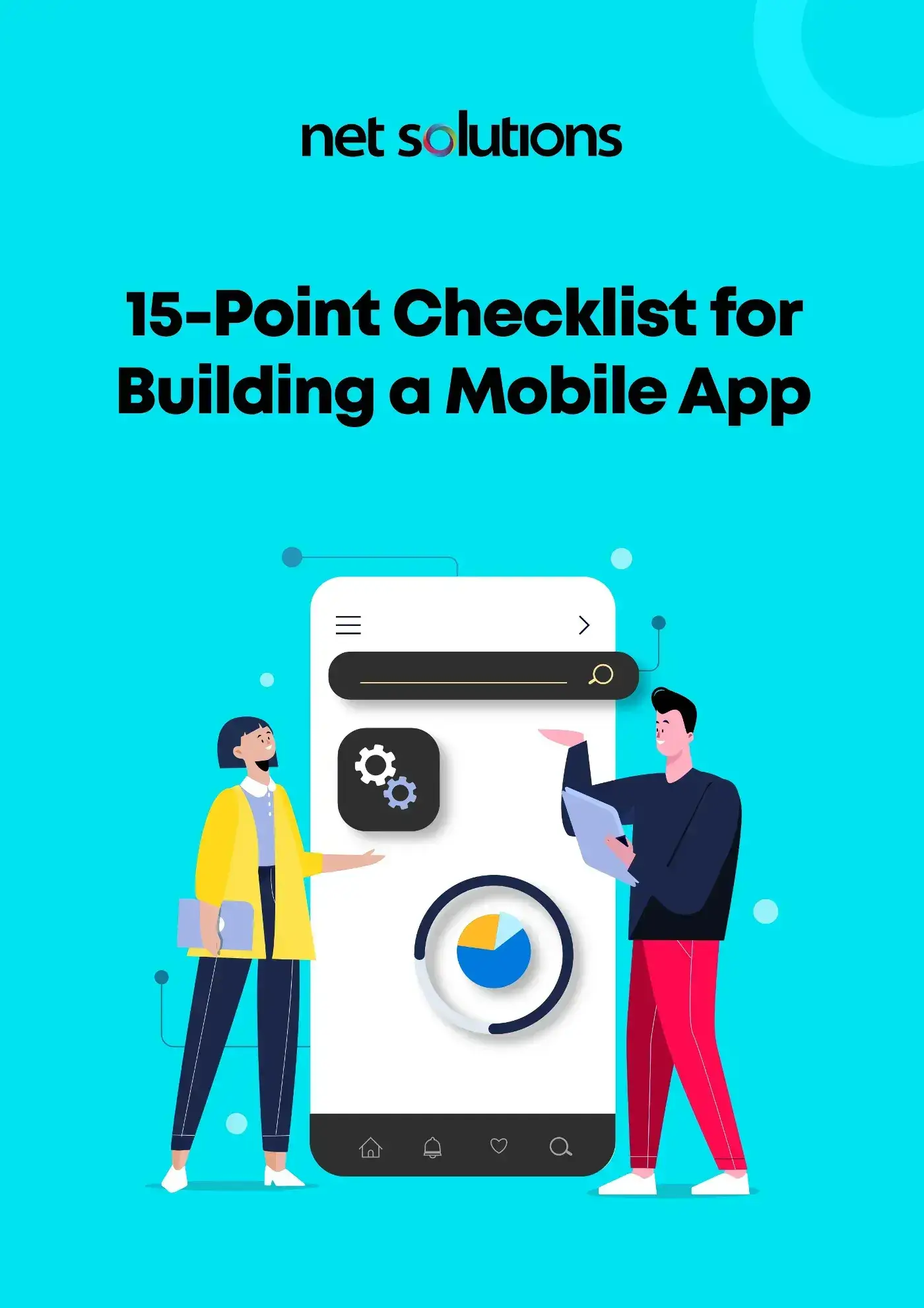
We respect your privacy. Your information is safe.
Benefits of Cross-Platform App Development
Gautam Agrawal, senior director of product management Sencha stated that:
Given the exponential increase in the cost of per platform development and the need for rapid time to market, cross-platform development is the way to go for the enterprise.
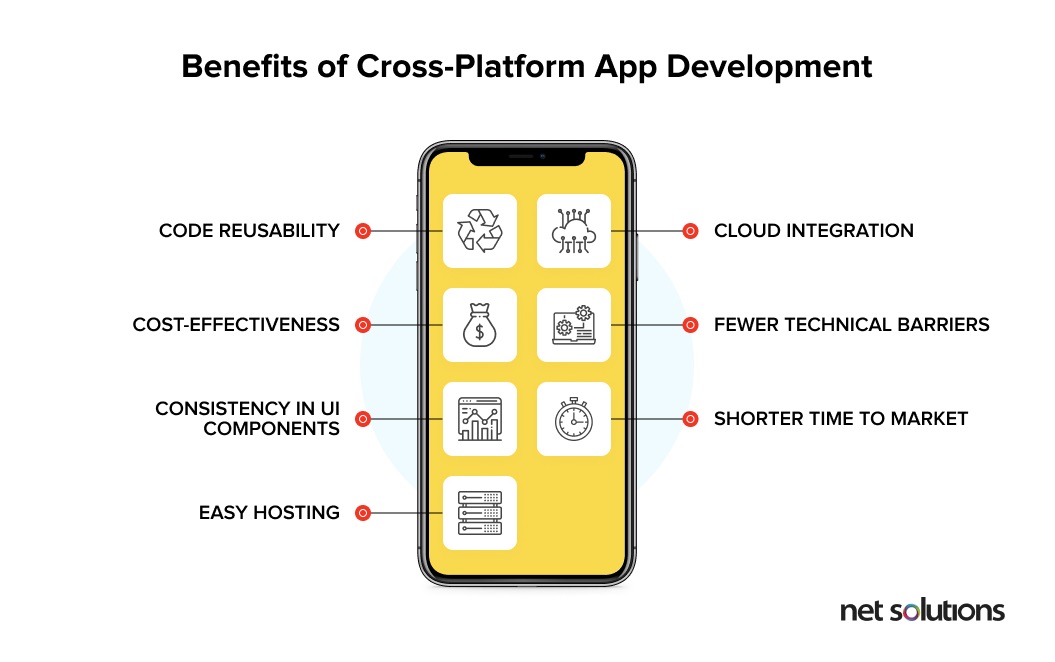
1. Maximum Exposure to the Target Audience
Leveraging a mobile cross-platform development approach enables a company to build an app and deploy it over various platforms, including the web. This means that, by building a single app, one can target both iOS and Android platforms. Thus, maximizing their reach.
2. Reduced Development Cost
The cross-platform app development is based on the concept ‘write once, run everywhere. Reusable codes and Agile app development processes and tools can lessen the cost of development. Therefore, in order to improve a business on multiple platforms in a cost-effective way, there is no other alternative to cross-platform apps.
3. Easier Maintenance & Deployment
In cross-platform app development, a single and a universal app is compatible for running on all platforms. This makes it easier to maintain and deploy code as changes are made. Updates can promptly be synced over all platforms and devices, thus saving time and money. Moreover, if a bug is found in the common codebase, it only needs to be fixed once. In this way, developers can save a lot of time and money.
4. Quicker Development Process
The quick development process is another win-win situation when it comes to developing cross-platform apps. Single source code for multiple platforms can help reduce the development efforts by 50 to 80%. The process helps to develop a feature-rich business app in less time. The team of developers can meet the expected deadlines in cross-platform app development.
5. Reusable Code
Another good thing about this platform is that the code can be used again and again. Instead of developers developing new codes for every platform, a single code can be reused. This saves time as well as resources because it eliminates repetition in the task of creating codes.
6. Easy Integration with Cloud
Cross-platform mobile apps are totally compatible and can take advantage of various plugins integrated with the cloud settings. In other words, the single source code is coordinated with various plug-ins and extensions to enhance the app’s scalability and functionality.
7. Faster Time-to-Market and Customization
As mentioned above ‘write once, run everywhere is the concept that is followed while building cross-platform app development. This allows app developers to reduce Time-to-Market (TTM) with quick deployment.
Also, if the app needs to be transformed or customized, it is easy for the developers to do minor changes in a single code. This helps to deliver products more swiftly than the competitors by improving customer engagement.
8. Uniform Design
Users can recognize user interface (UI) elements, and foresee their interactions over various platforms. Therefore, User Experience (UX) is an important thing to consider for any app or software.
It is hard to sync the various development projects while developing multiple apps. Cross-platform mobile development tools allow developers and designers to build a uniform user experience that app users can enjoy.
Open-source Cross-Platform App Development Frameworks Based on Programming Languages
Programming LanguageFrameworkJavaScript React Native, Cordova, NativeScript, Appcelerator Dart Flutter C# Xamarin Java Codename One Python Kivy, BeeWare Ruby RubyMotion
There are several cross-platform app development frameworks out there, each with its own set of pros and cons. The most competitive and top-performing frameworks available today are described below:
1. Xamarin
Loved by Developers, Trusted by Enterprise
Xamarin was launched in 2011 as an independent cross-app development framework but was later acquired by Microsoft in 2022, thus lending it more credibility than before.
It is an open-source framework that was launched to solve the problem of disjointed, native technology stacks, which made mobile app development a difficult and expensive affair.
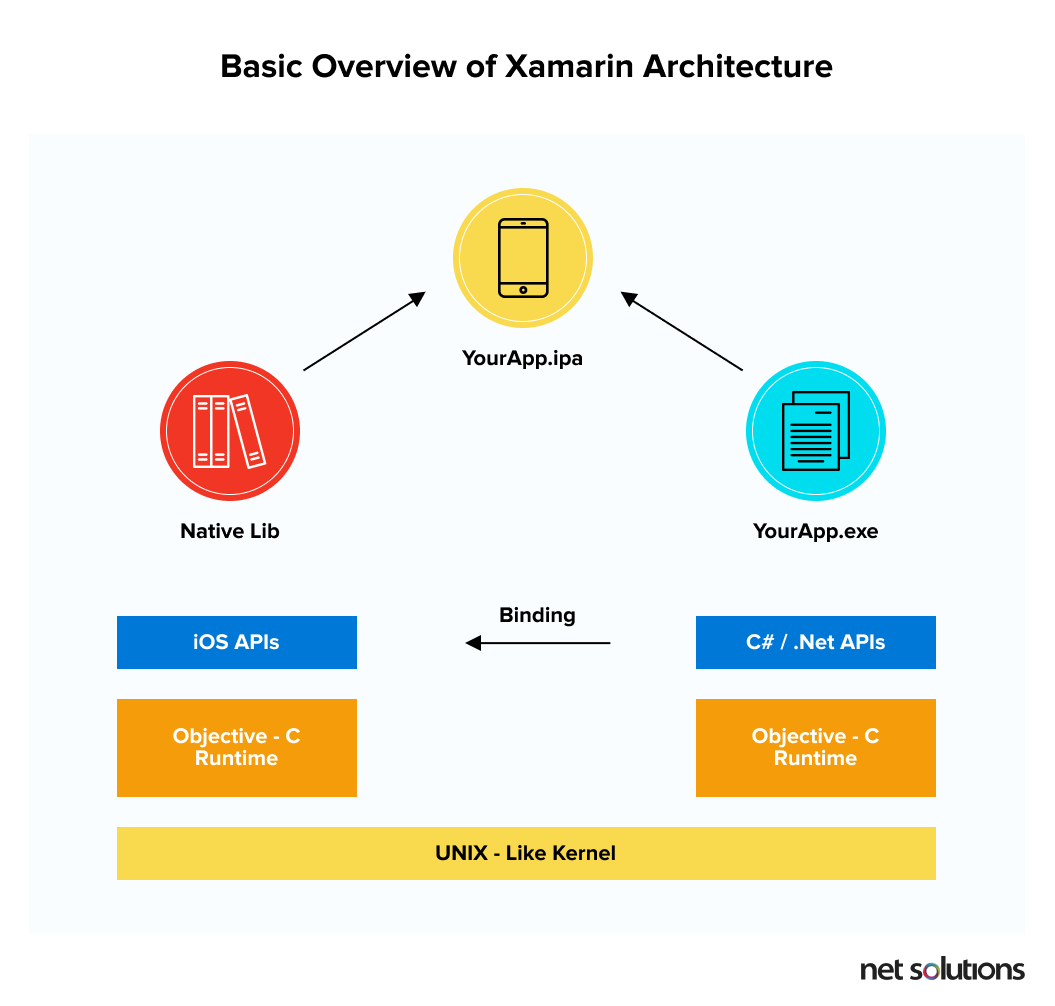 Pros of Xamarin
Pros of Xamarin- Xamarin app development uses C# for coding. This means that it works seamlessly on an array of platforms (including Android and iOS)Xamarin has a strong community of over 60,000 contributors from more than 3,700 companiesXamarin allows for sharing more than 75% of code across platforms, for “write once, run anywhere” easeXamarin consists of a single tech stack for faster development
- Xamarin is expensive for enterprises.
Xamarin is a framework that comes không lấy phí for individuals and startups, however, enterprises are required to buy a license for Microsoft’s Visual StudioXamarin is not recommended for apps that demand heavy graphics because each platform has a different method for visually laying out screens. A UX/UI-rich application is advised to be implemented
nativelyXamarin also offers limited access to certain important libraries that the app developers need for mobile app development. Also, since the core of its user-interface creation is not mobile, creating the UI is time-consuming
 Apps Made with Xamarin Cross-Platform App Framework
Apps Made with Xamarin Cross-Platform App Framework- Fox SportsAlaska AirlinesHCLAmerican Cancer
SocietyBBC Good Food
2. React Native
Learn Once, Write Anywhere
React Native is an endeavor that Meta launched in 2015, and it did cause a wave in the market for hybrid frameworks. Within a few years of its introduction into the market, React is already one of the most popular cross-platform app frameworks (and the most trending framework amongst the 5 cross-platform app frameworks discussed in the blog).
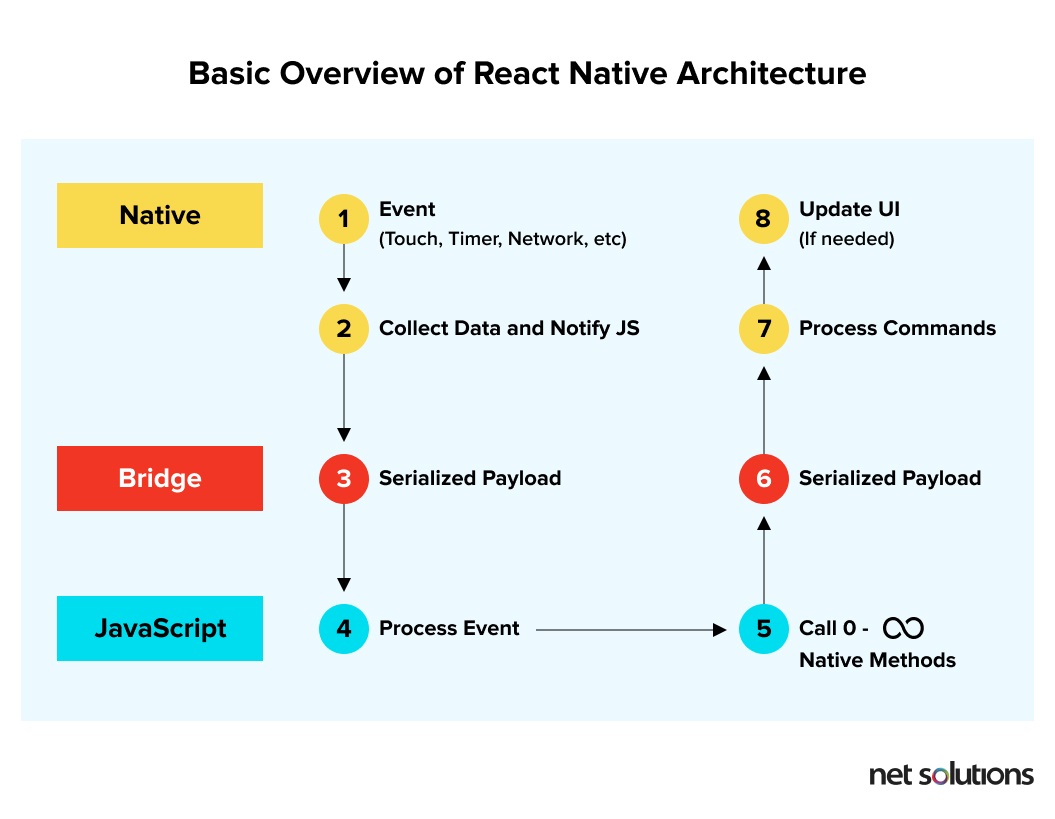 Pros of React Native
Pros of React Native- Up to 80% of a codebase can be shared across platforms, depending on the app’s complexity. Code reusability significantly speeds the development processReact allows for previewing results right away and offers ready-to-apply elements, thus shortening the developing time considerablyThe
Hot Reloading feature enables developers to see changes made in code within seconds, not minutes, like when using native technologiesReact Native focuses on UI to a great extent rendering a highly responsive interfaceIt also provides access to certain useful native functionalities like accelerometer and camera. This allows for rendering a high-quality, native-like user interface
- React Native is not fully a cross-platform app
framework. To use some functions as a camera or accelerometer there is still a need to use native components meaning there will be a separate code for Android and iOSSince the framework is not built in conjunction with iOS or Android, it lags behind the native platforms times. This is one of the reasons that led
Udacity to stop investing in React Native for new featuresReact Native lacks consistency when it comes to releasing updatesReact Native improves the speed of development, but also increases the duration of the debugging process, especially on Android

Also, in the Stack Overflow ‘Developer Survey Results, 2022’, React Native was found in the category of dreaded frameworks for the first time.
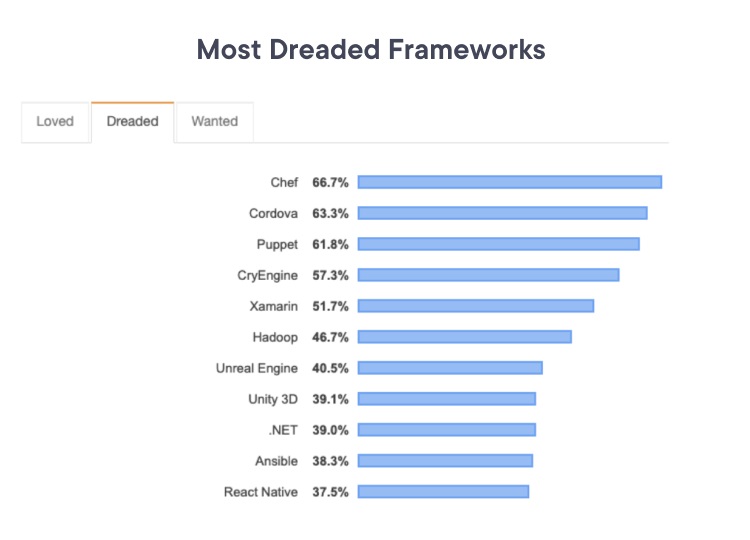 Apps Made with React Native Cross-Platform App Framework
Apps Made with React Native Cross-Platform App Framework- InstagramBloombergPinterestSkypeTesla
3. Flutter
Beautiful Native Apps in No-Time
Flutter is another open source and không lấy phí cross-platform framework for creating native interfaces for Android and iOS.
Flutter may sound familiar!
One might be thinking: if Google announced Flutter recently in February 2022 Mobile World Congress and released its first version on December 5th, 2022, how did it get mentioned in this list of cross-platform app frameworks?
PS: In May 2022, Google announced the availability of the new stable build, Flutter 1.7.
Remember, Flutter is a cross-platform app framework
maintained by Google, the very same organization that develops
the Android Native Framework. A survey held by Stack Overflow describes other reasons that flutter deserves its spot on this list.
In the Developer Survey Results, Flutter was amongst the top 3 most loved frameworks. Additionally, it added more competition to the already decreasing popularity of the React Native framework.
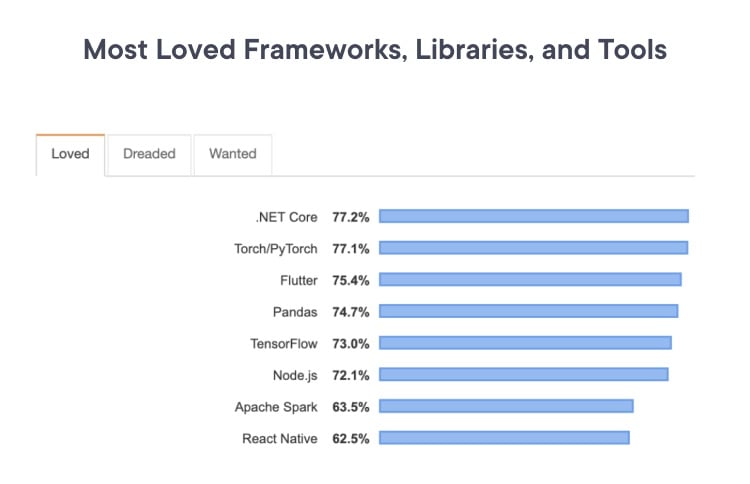 Pros of Flutter
Pros of FlutterRelated Article: How Continuous Integration and Continuous Deployment Helps to Deliver a Great Software Product
Cons of Flutter- There is limited TV support with apps built on the Flutter framework (i.e., Flutter offers no support for Android TV and Apple TV)Though by
virtue of being developed by Google, there are several libraries with ready-to-implement functionalities, however, Flutter still lacks when compared to native developmentSince Flutter-enabled apps use built-in widgets and not platform widgets, the app’s size is usually bigger. Currently, the smallest possible app made with Flutter can weigh no less than 4MB
- AlibabaGoogleGoogle AdsTencent
Conclusion
Cross-platform apps are popular as it eliminates the effort to develop different apps for different platforms. A cross-platform app can run across devices and platforms seamlessly. To develop this universally compatible app, a cross-platform framework is essential.
The question is, which out of the mentioned cross-platform mobile app development frameworks is the right choice? The straightforward answer: it depends on the business and app’s functional requirements. However, consulting a skilled and experienced cross-platform mobile app development company can help make a well-informed decision.
So, before you build a mobile app development solution for your customers, make sure you are well-equipped with all the necessary information about app development frameworks.
What is an advantage of developing software using a single platform model?
What is an advantage of developing software using a single-platform model? The software can perform better, and it is easier to check the software for errors because it was tailor-made for a specific platform.Which type of end user license is considered a volume license because it allows?
Volume licenses: allows the Licensee to install the software on a certain number of computers. The licensee usually has to satisfy a minimum purchase requirement and obtains reduced prices in exchange.Which type of end user license is considered a volume license because it allows the licensee to install the software on a certain number of computers quizlet?
Enterprise licenses (volume licenses) - intended for medium and large organizations. Allows installing software without restriction using same activation code until cap is reached. Volume = less cost than personal license.What compatibility information should you confirm before installing a software application quizlet?
What compatibility information should you confirm before installing a software application? That it works with the version of the operating system that you have, and that your computer meets the system (hardware) requirements. Tải thêm tài liệu liên quan đến nội dung bài viết What is not considered a challenge of using cross-platform applications?